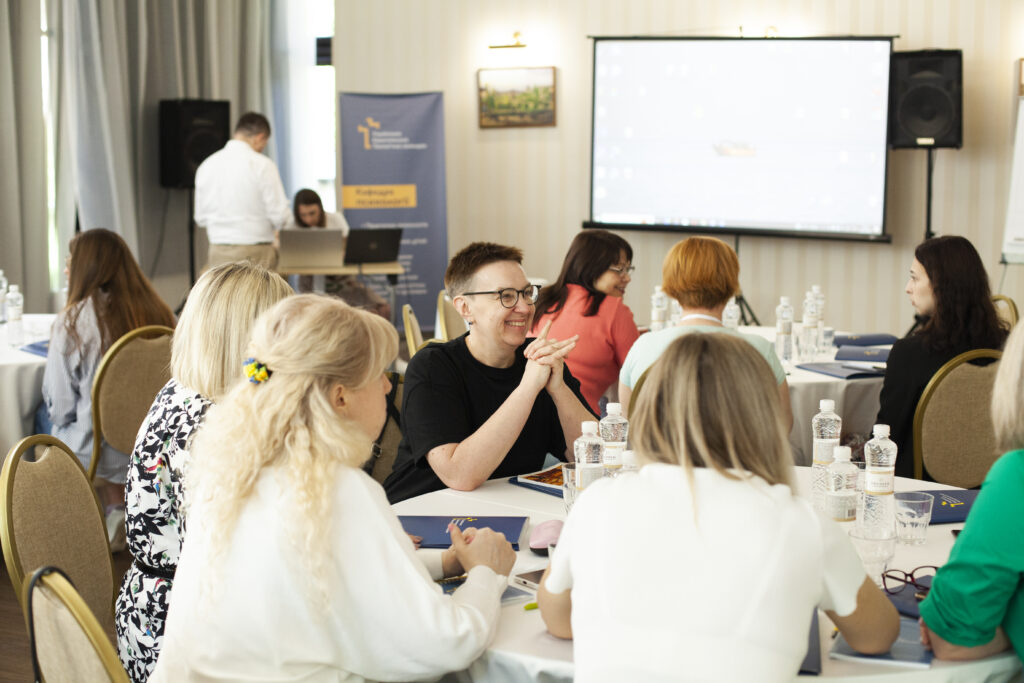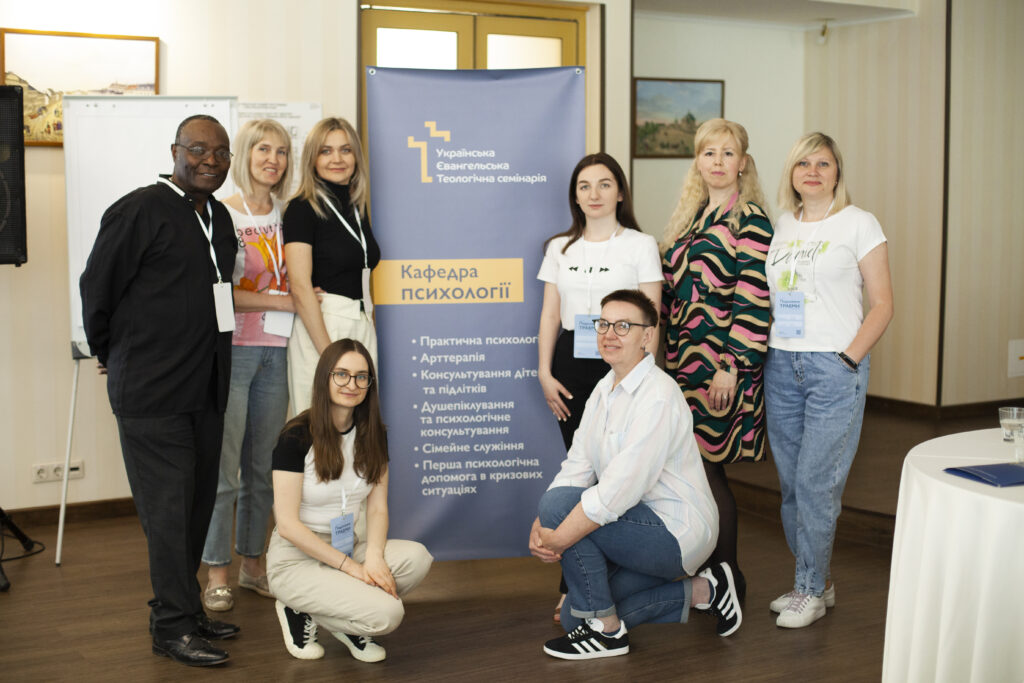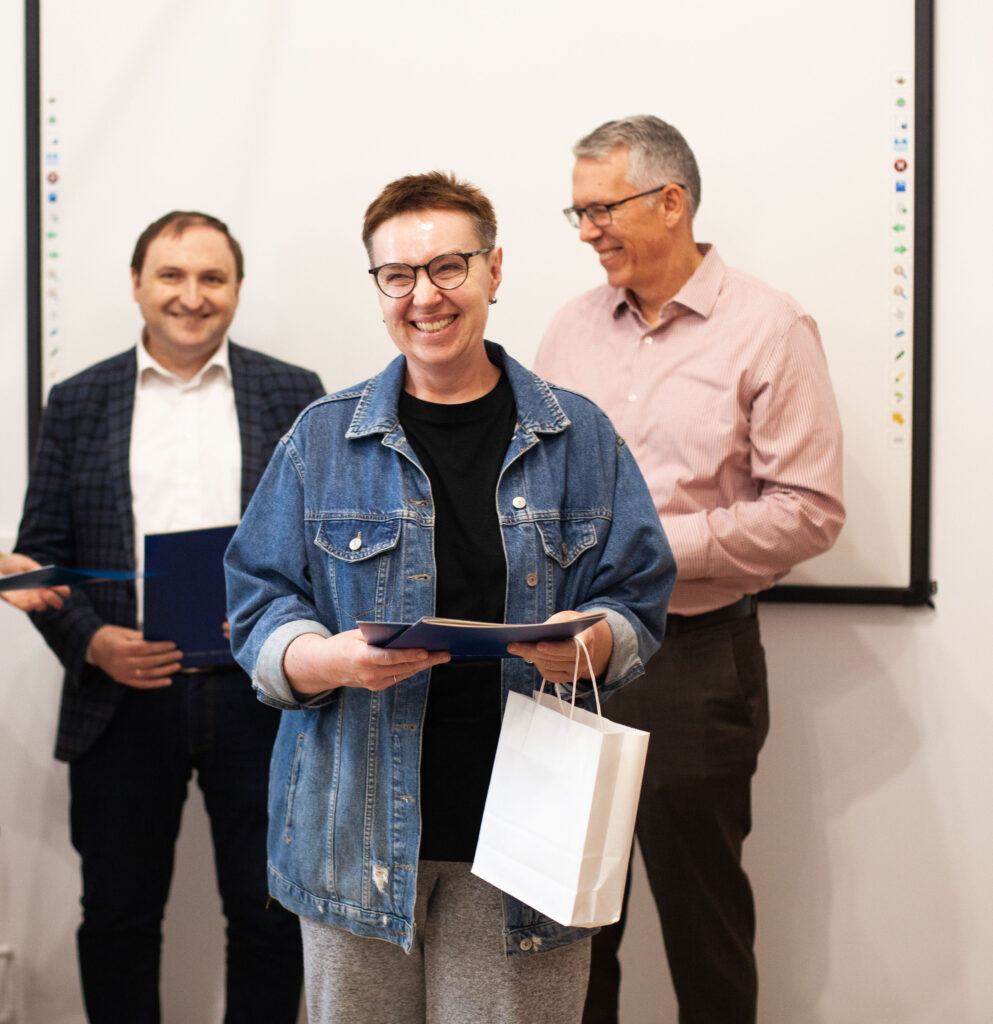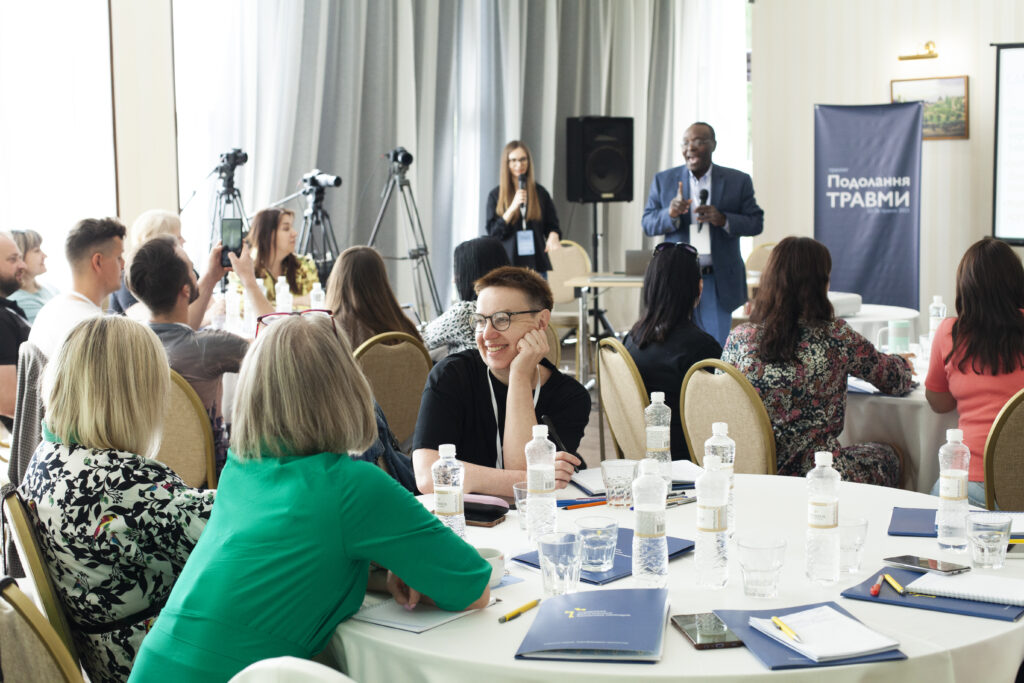
Iryna Stefanenko is a wife, mother of two children, doctor, manager, and psychologist. She is a student of the UETS Practical Psychology Program. Currently, she takes care of personnel recruitment, management, and training at a pharmaceutical company. Iryna is a member of the Church of Jesus of Nazareth in Vinnytsia. When the full-scale war broke out, she, together with other church leaders, started holding psychological support groups for the men and women of her church. In this interview, we are talking with Iryna about the importance of psychological counseling and how to best integrate it into church practices.
Could you please tell us about your current ministry? How has it changed since the war started?
I love serving children and teens, and teaching at Sunday School has been my primary ministry for a long while. At the time when I was starting to study psychology at UETS [red.: three years ago], we had a plan to take in orphans from boarding schools to live in one of the buildings of our church, and we needed a psychologist who could work with them. But neither I nor any of my church leaders really knew what this would all turn into.
When the full-scale war came into our lives, it completely changed our plans. We started hosting refugees at our church and taking care of them. At the same time, the picture of the future was very unclear to us.
We could see that many people needed psychological support. So a bit later, I started doing individual counseling at my church, and I promised God that this is what I would be doing free of any charge for church people.
We also started holding psychological support groups for women and for men – we call them “Women Get-Together” and “Men Get-Together” meetings.

How do you conduct your support groups? What does a typical support group meeting look like?
We are holding meetings for women together with my friend and sister in Christ, Anna Halbai. As a rule, we are doing a photo-zone – a different one for each meeting. There’s always some music – we are trying to create an atmosphere. Then we start it all with team building. Afterwards, I always do a theoretical part on some topic. For example, the first meeting was devoted to the topic of Self-care. Then we usually do some art therapy activities. And then we are having a meal and some free time to communicate with each other.
Meetings for men are very similar, but with men, we do have to eat twice – at the beginning and at the end of the event. We are holding these meetings with the help of my Bible Group leader, who is also my mentor and UETS student at the same time. He usually does the theoretical part for men. And then, I do art therapy activities. And you know, they actually like it.
Is it more challenging to work with men than with women?
At first, it was quite a challenge. There’s been some level of resistance. But the support of my pastor and of my Bible Group leader really helped.
The difficulty lies in the fact that, on an emotional level, men function in a different way than women do. Men are not really used to talking about their feelings. And I can understand them, as I myself was raised in an atmosphere where you were considered a complete loser if you talked about your emotions and hardships. So I can imagine what men must be feeling like in a culture where men should always remain strong, kind of a “superman.”
Do you see a future for such support groups?
I definitely see a future for such meetings. The thing is that all, including men, need inner renewal. Maybe later, these meetings will develop to a point where people will be inviting their non-Christian friends to attend. And maybe these new people will later join the church. We will see what it will all turn into. I really wonder what God will be doing next.

And how did you start to do individual psychological counseling at your church?
Well, first of all, I asked my pastor for permission, and he agreed to this. But it all started with support groups, really. At these meetings, I started telling people that if, during the support group, they spot something in themselves that needs to be healed, they can come for individual counseling. I also told them that in case they felt uncomfortable working with me, I would direct them to someone else. And I am now saying this at every support group that we are holding. And this way, people from our church started coming to me for individual counseling.
But then something rather extraordinary happened – I don’t know how they found me, but people from outside the church, non-Christians, started coming to me for counseling. So I am now working with them as well.

What kind of questions do people usually bring up to you?
You know, it is very interesting, but people are usually coming to me with the same kind of questions that I’veI’ve been working on myself with my therapist.
Oftentimes people come with the need to better understand themselves, their needs, and their emotions and to learn to deal with their emotions in the right way.
Did you work with people with war trauma?
Yes, I lead a support group for people from occupied territories. This was a very difficult group to work with. From what I see, group work is not the most effective way to help people overcome trauma. But these people are very afraid to work individually with psychologists.
Oftentimes, people ask me if they could share my contact with someone who was under occupation, but eventually, very few of those contact me, and I understand that people are afraid to do that. Unfortunately, traumatized people, people who have been under occupation, have this permanent feeling of danger, and it is very difficult for them to trust someone.
Could you tell us about someone whose life was affected by your ministry?
I remember one sister in Christ gave me the following feedback: “People around me say that I have changed, that I look freer now.” This is what I can tell. I understand that I influence people’s lives, but I did not set myself the goal of analyzing how I affect people. However, thank you for your question. It is worth taking some time to think more about it.
What questions do you ask yourself to make your ministry more effective?
Currently, I am asking myself, and I am asking God where I should be going next. I am asking myself if I should continue working at my current job or if I should devote myself fully to psychological counseling. I ask myself questions relating to my own therapy, for how long should it continue? I understand that I can only give what I have myself.
I also ask myself questions about how to remain a psychologist with a very firm Christian foundation and worldview. I ask myself how to remain God’s servant in the first place and use psychology as an instrument. How to remain in God’s will in all that I am doing?

How did studying at UETS influence you and your ministry?
Well, first of all, it really influenced my worldview. It felt like I had some kind of blinders on that limited me, but then I got rid of them. It’s not that I became more tolerant of some worldly ways, but I gained a deeper understanding of why certain things are happening. I became more compassionate and less judgmental. You know, I understood that theology – it is so tasty and not boring at all. Life has become much more interesting for me after seminary.
As for my ministry, I think I am just starting to do it as I should. I think it is only after the seminary that I have gotten into the ministry track that I can truly call mine. And I can truly call it God’s calling for me. And we still have to see what’s coming next.
